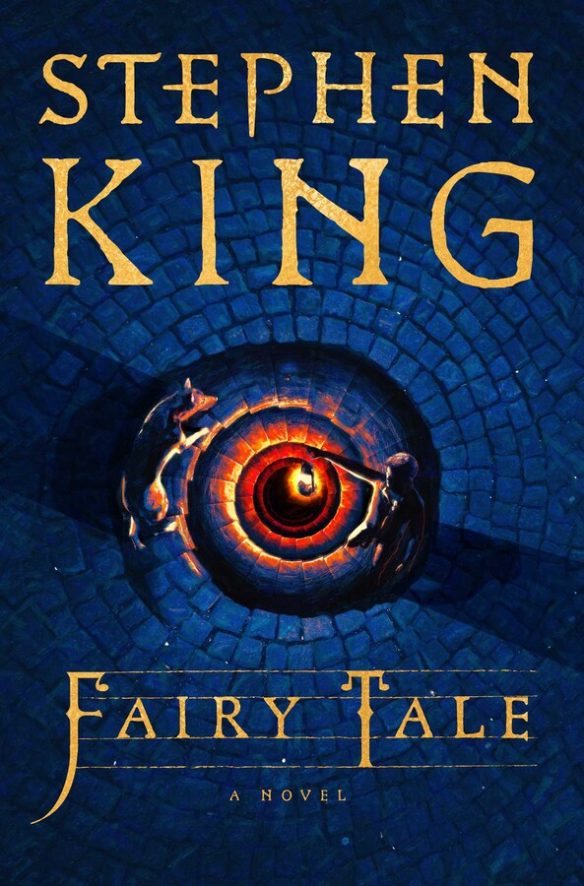
By Daniel Dern. For many years now, Jane Yolen, among others, has been researching, teaching, writing, and panelling the dark pre-Disney roots of fairy tales.
In Fairy Tale, his newest novel, Stephen King delivers a, cough, grimm contemporary story, explicitly incorporating horror in the, cough, spirit of Lovecraft (King also explicitly namedrops, in the text, August Derleth, and Henry Kuttner), in which high-schooler Charlie Reade becomes involved in things — and challenges — that, as the book and plot progress, stray beyond the mundane. There’s a dog involved — in this book, a good one rather than a bad one. (King does, amusingly have Charlie namedrop “Cujo” — the St. Bernard from King’s early eponymous novel — early on.)
And lots more. There’s guns and gold. No riddle scenes, no dragons.
Personally, I’m inclined to label Fairy Tale “dark fantasy,” whatever that means, rather than horror, although as I think about it, both feel correct. (Darrell Schweitzer or some other horror expert is welcome to weigh in.) But it’s not the “because evil/unhappy spirits of buried bones” that it feels like too many of King’s books end up blaming.
If you are already a King fan, you’ll want to read Fairy Tale. (I’ve read lots of King, though not all, for example, not the Dark Tower books, although I have one friend who loves them.)
If you haven’t read King yet, or only a few, but you’re open to dark bordering-on-horror fantasy, I recommend Fairy Tale. Does it have a happy or unhappy ending? Is there a pile of gold? No comment. The only non-spoiler comment I’ll make: The story is told first-person, Charlie unreeling events from a long-after perspective. So Charlie doesn’t buy the farm.
I know, heckofa non-review. It’s King, so well-written, long (though by today’s standards, average length or even, since it’s a one-and-done, technically almost short). Good, real characters. Clear prose, great pacing.
Or, to boil it down to a short sentence: “Stephen King’s got a new dark fantasy/horror novel out, worth reading.”
Discover more from File 770
Subscribe to get the latest posts to your email.

Hmmm. I’m not King’s biggest fan. But dark fantasy is my thing.
I’m in the middle of this now. Weirdly, and this isn’t an insult, the fantasy elements of it are, to me, the weakest parts of the book. Maybe that’s because the set up is so very strong. It’s definitely a suck-you-in read so far.
And doggo is Best Doggo.
I agree with Melanie, I was actually most impressed with the long, more mundane set-up. The fantastical part was still entertaining on the whole but the very gradual hints at the magical/horror in an otherwise ordinary small town is King at his best.
King’s hangups about ugliness, disfigurement and disability as either the impact of evil or an outer side of inner evil is a major part of the fantastical setting also.
//And doggo is Best Doggo.//
100%
Such a good dog.
I’m kind of torn, because I really liked the book for the way it wove the story in with an almost academic treatise on fairy tales and their importance to our collective imagination. Plus, the story was pretty terrific all on its own. But what kept bringing me out of the book is that the protagonist is 17 during the story and not more than a decade older as the writer, but the language and many of the cultural touchstones are that of a man in his 70s. Since there’s no grandparent in the picture to have passed on very generationally specific sayings and outlook, KIng is relying on only an abiding interest in Turner Movie Classics for that and it’s not enough to convince me.
Yeah – it may as well have been a book narrated by an older man in the present but set in the 50’s, 60’s or 70s. If it had been set in the 1950s but narrated in the now, that would have added an interesting element to the ending of the book, as the narrator would now be facing some interesting decisions regarding a key plot point in the fantasy aspect of the book.
Obviously, I know so much more about how to write a book than this King fellow 😉
@Camestros Felapton — True. But Timothy would not have fared as well — nor, I suspect, been as helpful — as Radar…
@Cheryl S., I’ve had issues with the Turner Classic Movies thing, too. It’s not a dealbreaker but it’s a struggle. Particularly as I don’t recognize even a third of the references, and I used to watch Classic movies with my grandmother, am an original Perry Mason fan, and the main character is my sons’ age. (King would have done better with SpongeBob and Phineas and Ferb references because I don’t think my kids have watched even a single black and white film.)
I’ve always wondered why King avoids describing certain character’s attributes and instead refers to actors of which many people my age and younger have never heard. As a writer, I’m not sure the shorthand is worth the gamble.
…But maybe he also knows we’re not afraid of Google so I forgive him lol.